

It began like a slow sprinkle—first the whispers, then the headlines, and ultimately, the fallout. It was the kind of year where every time the smoke began to clear, something new seemed to ignite. For fans, it was a bullwhip. For insiders, it was a crisis silently unrolling behind the bright lights of stadiums and sponsorships. Shohei Ohtani found himself tangled in more than just curveballs. Off the field, 2025 threw him a few too many unexpected pitches, from personal deceit to financial scandal. But just when it felt like the strikes were adding up, a federal court brought flabbergasting relief.
Watch What’s Trending Now!
Just as Ohtani was already dealing with a media frenzy over his interpreter’s shocking gambling story, another breaking ball came flying his way. This time, it had less to do with baseball and more with billions of digital dollars. The two-way superstar found himself listed among several celebrities, such as Tom Brady, Stephen Curry, as well as Naomi Osaka, who were labelled in a massive class-action lawsuit tied to the spectacular collapse of FTX, the once-hyped cryptocurrency exchange. The litigation accused these personalities of serving as “brand ambassadors” while allegedly overlooking red flags about FTX’s shaky foundations. But as it rolled out, the legal storm did not quite hit Ohtani as hard as it could have.
In a noteworthy turn of events, U.S. District Judge K. Michael Moore ruled on May 8 to dismiss 12 of the 14 claims brought against the celebrities, including Ohtani. The judge’s 49-page verdict explained that there was no concrete testimony proving the sportspersons and influencers were aware of the fraud that was looming behind FTX’s flashy façade. He made it transparent that receiving promotional payment alone was not enough to confirm the conspiracy. “Simply promoting a brand does not make you guilty of its crimes” was the essence of his judgment. For Ohtani, who had already been warding off controversy, this decision came as a major sigh of relief.
Yet, the court did not throw out everything. The judge allowed two claims to move forward—one under Florida law associated with promoting unregistered securities, and another based in Oklahoma. Specifically, this means the lawsuit is not dead; it has just been trimmed down. The petitioner now has a chance to refocus their argument, possibly targeting the legal technicalities around endorsements and securities law. As stated by Adam Moskowitz, the attorney representing the investors, the ruling still counts as a win. Florida’s strict liability laws do not require proof of intent, meaning Ohtani and others could still be held responsible simply for engaging in FTX’s promotion, regardless of their knowledge or intent.
It is impossible to distance this legal mess from the deeper crumbling that was the FTX collapse. At its peak, FTX was the third-largest crypto exchange globally, boasting over one million users and massive backing from investors and public figures alike. But by late 2022, the organization spiraled into bankruptcy, exposing an $8 billion black hole in customer funds. With CEO Sam Bankman-Fried found guilty of fraud and sentenced to 25 years in prison, the case has drawn comparisons to scandals like Enron and Madoff. What made things even gloomier? FTX used celebrities—including beloved talents like Ohtani—to build trust among retail investors.
And here is where it gets complicated. Even if these influencers did not knowingly mislead anyone, their influence helped FTX lure in everyday customers. It is why the lawsuit argues that figures like Ohtani helped enable what federal prosecutors called “one of the biggest financial frauds in American history.” And let’s not forget—this took place just as the Dodgers star was trying to distance himself from the gambling activities of his former interpreter, Ippei Mizuhara. The timing could not have been worse. But for now, with most allegations dismissed and the court signaling a lack of solid evidence, Ohtani has escaped the worst of it, though not entirely untouched.
Have MLB stars like Shohei Ohtani learned their lesson?
The collapse of FTX sent tremors across the world of professional sports. While much of the focus in the beginning went on NFL and NBA stars, MLB was not spared. In fact, MLB’s link to FTX ran deeper than some isolated endorsements. It was engaged in institutional alignment. The league itself had inked a multi-year sponsorship deal with the crypto exchange in 2021. It effectively placed the FTX logo on its umpire uniforms. This was not a small branding decision—it marked the first-ever corporate patch worn by umpires in MLB history.
Currently, the question is whether MLB stars—and the league itself—will treat the FTX issue as a cautionary tale. Since the fallout, there has been a marked pullback from crypto affiliations across the game. The league has not declared any replacement for its FTX link. In addition, it has equally failed to leap into similar high-risk financial sectors. However, stars and their agents appear to be vetting sponsorships more rigorously. The Professional Baseball Players Association circulated internal advisories saying caution needs to be exercised when dealing with crypto companies. Such a shift highlights a larger recalibration of risk tolerance within MLB’s commercial ecosystem.
Yet the lesson could go beyond crypto. FTX’s implosion highlights the larger issue of stars being thrust into intricate financial services without sufficient legal safeguards and due diligence. The risk is larger for global stars like the Dodgers’ two-way star, who rely on advisers across linguistic and regulatory boundaries. The aftermath has prompted multiple stars to analyze the aspect of their endorsements—whether they truly understand the services they are endorsing and what fiduciary liability they carry forward for their fans who idolize them.

For a game looking for global identification, the FTX issue was a harsh reminder that not all partnerships carry equal weight. The damage—financial and reputational—has established a new precedent for caution. In addition, while MLB’s slow and considered retreat from the crypto space could frustrate marketers, it could ultimately safeguard its credibility with fans and protect its stars from future fallout.

